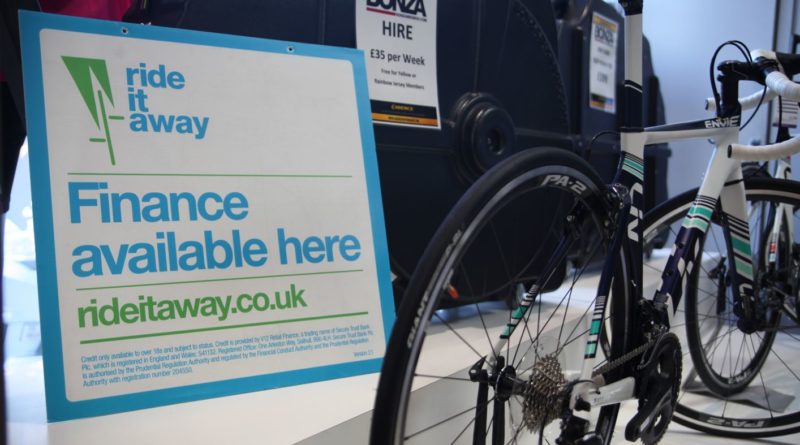Responsibly using retail finance as consumers go careful with cash
We find ourselves in another period where consumers are being forced to tighten their spending. But with cycling a great way to cut transport expenditure, is it again prime time for retail finance tools? We ask the ACT…
Data from Mintel published in the summer of 2021 suggested that the first year of the Covid pandemic gave rise to a 22% uplift in in the sale of bicycles in the UK, increasing from 2.7 million in 2019 to 3.3 million in 2020. The good news is that, although society is essentially fully reopened, the UK’s love for cycling shows no sign of abating, whether as a commuting option, a way of exercising (more UK adults enjoy cycling than running, playing football and strength training) or as way for families to get out and enjoy social time together. In case you missed the data published on CI.N in August, rates are said to be up 47% year-on-year (weekdays) and north of 150% above the weeks preceding the UK’s first national lockdown.
Whilst accommodating and encouraging this growing interest in two wheels is good news for the cycle sector, as the cost-of-living crisis bites and the threat of imminent recession looms large, the challenge for the sector remains making cycling affordable at a time when not many things feel like they are. That’s where effective and creative financing solutions come into play.
Bicycle shops being excluded from the list of retail businesses that were forced to close during successive Covid lockdowns really highlighted the important role cycling can perform when people’s access to normal travel methods and leisure activities, like gyms and swimming pools, is restricted. Cycling became the go-to option for those who needed to travel but didn’t want to sit on a crowded bus or tube train; it became the preferred form of exercise for those unable to engage in team sports and, with theme parks closed, family bike rides were a viable alternative for enjoying time together.
Whilst this led to an increase in new bike sales, what was obvious from the outset was that, when facing uncertainty, consumers opt to hold onto as much capital as possible. Consequently, the percentage of sales on retail finance increased at a larger rate than the sales themselves ie. the percentage of customers looking to spread the cost of a higher ticket item increased.
This increase in customer desire to hold onto available funds isn’t restricted to the cycle sector nor just to higher priced items. When customers’ buying choices are restricted, and they can’t view items in person, their willingness to pay for goods upfront decreases. This led to a huge increase in the use of ‘Buy Now Pay Later’ (BNPL) as a payment method. Deferring the payment, often until the goods have been received, gives customers confidence to make the purchase.
In August, the Bank of England announced a rise of 0.50% in interest rates to hit 1.75% – the largest for 27 years – predicting that inflation would edge above 13% with a recession beginning later this year, which could be the longest downturn since the financial crash of 2008. Once the dust has settled on the announcement, retailers need to process the implications for their customers and adjust their strategies accordingly.
As we saw during Covid when there is uncertainty in people’s short-term finances and future expenditure, they opt to retain cash reserves. This, though, doesn’t automatically mean that they don’t want or intend to purchase goods. Effective retail finance is likely to become an even more popular customer payment option as the economy goes into recession.
Whilst previously we saw an increase in sales as people didn’t want to use public transport, this time we may well see a shift towards eBikes if people can’t afford or choose not to use their personal car so much. Again, with a high average price of an eBike, retail finance will likely become a very attractive customer option. It is also certainly cheaper in the long run than buying on most credit cards.
Some might argue that this ‘buy now, pay later’ approach is serving only to cause consumer debt to rise leading to an increase in repayment issues further down the line. To an extent, whilst this can never be completely ruled out, this is dependent on the type of credit, the value of the item and the market sector in question.
Contrary to what you might expect, it isn’t higher value items purchased on traditional retail finance that have been highlighted by debt charities, the Financial Conduct Authority or the Treasury as causing most of the consumer harm. Access to longer term credit must, by law, include affordability checks and the finance provider must be able to demonstrate the customer could afford the repayments at the point when they applied for the credit.
However, the huge swing towards BNPL as a purchase method has seen customers get into serious financial trouble.
2021 data from TSB showed a 59% increase in use from the previous year, resulting in one in five UK residents taking advantage of BNPL services each month. Klarna the largest company already has over 15 million UK customers.
Unlike traditional retail finance, BNPL providers aren’t legally required to carry out affordability checks or share information with credit agencies. The lack of checks and transparency, as well as a general misunderstanding around BNPL, has resulted in the Treasury publishing its initial proposal on how to regulate the BNPL market and give customers the same protection using BNPL as when using a credit card or traditional retail finance.
 Much of this is due to confusion by both retailers and consumers about what BNPL is and how it works:
Much of this is due to confusion by both retailers and consumers about what BNPL is and how it works:
- Recent research by Barclays and the StepChange debt charity has shown retailers do not fully understand the credit options they’re presenting to customers with 54% wrongly thinking that most buy now, pay later (BNPL) companies perform a full credit check before deciding to lend money to a consumer. Another 52% mistakenly believe that all BNPL brands report their lending to the UK credit reference agencies.
- A survey of 2,700 users of buy now, pay later services found more than half of 18 to 34-year-olds consumers had signed up without realising, while 35% went onto regret their debt-fuelled purchases.
- Two in five of those surveyed by Citizens Advice between January in February felt what they had signed up for was not ‘proper’ borrowing in the same way a credit card or loan was, and 42% didn’t fully understand what they were signing up for.
- Around 31% of Britons who have used BNPL service say the lending has got them into problem debt, as repayments have become unmanageable and Citizens Advice found more than 40% of BNPL customers are relying on other methods such as credit cards, overdrafts and loans from friends and family to keep up with repayments.
So with misunderstanding and new regulations coming forward, how can an independent retailer stay on top of the situation?
Well, in short, these changes in customer habits are here to stay for at least the foreseeable future so retailers in all sectors need to accept this and adapt. Whilst larger retailers can have in-house expertise to manage the process for them, IBDs don’t have access to such resources within the business.
To compete with some of the larger players online and offline, IBDs are encouraged to take the ACT’s Retail Finance Training, an online learning course delivering an informed insight into retail finance that can be completed anywhere, any time. This will show your staff how to effectively promote retail finance, encouraging customers to maximise their spending through techniques such as financial promotion, Point of Sale (POS) and bundling. This could be valuable for retailers with surveys showing that consumers are more likely to spend a higher amount if retail finance is sold correctly, and that, for many customers, having the option to spread the cost is the main reason a purchase is made.
ACT Members can access a retail finance course from £75, just see: indieretail.training
Try the demo free at: demo.indieretail.training
Alternatively, call the ACT on 01273 427 700, or email info@theact.org.uk.



